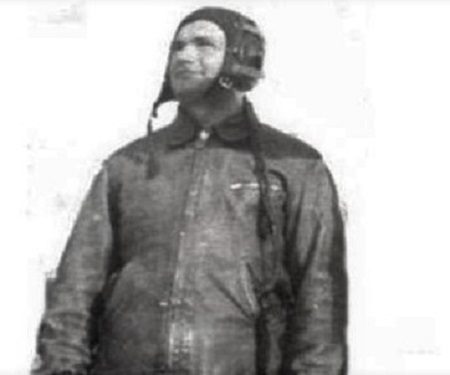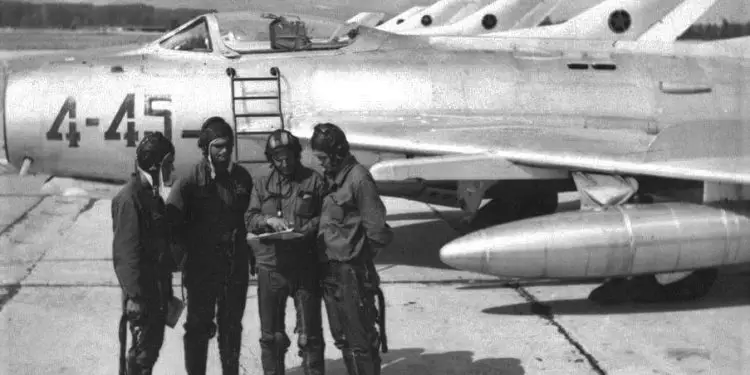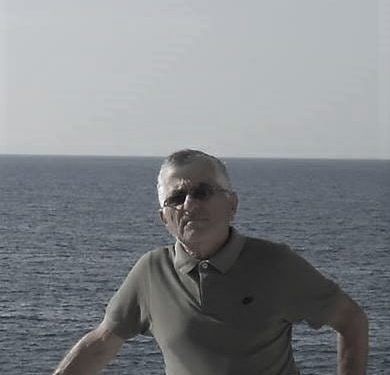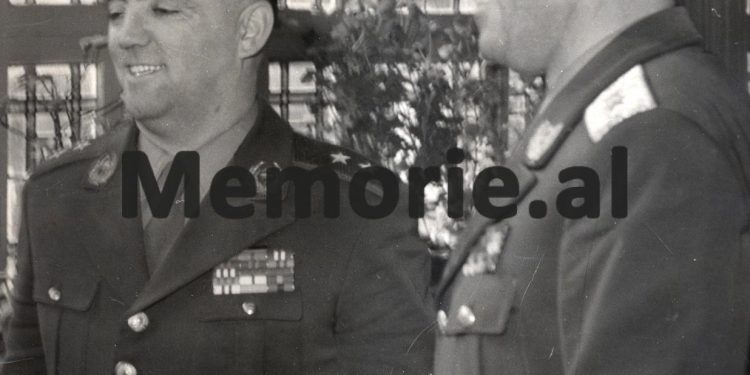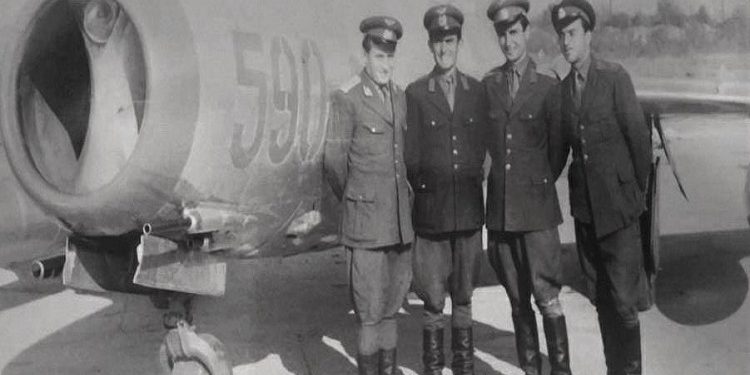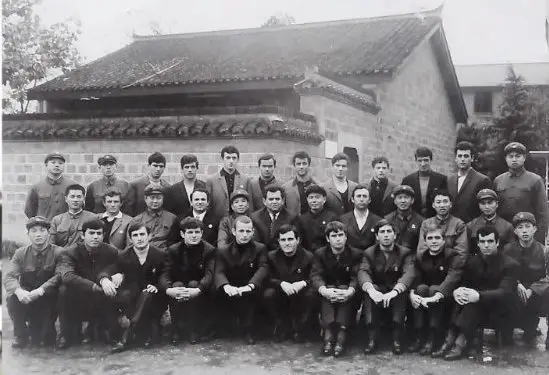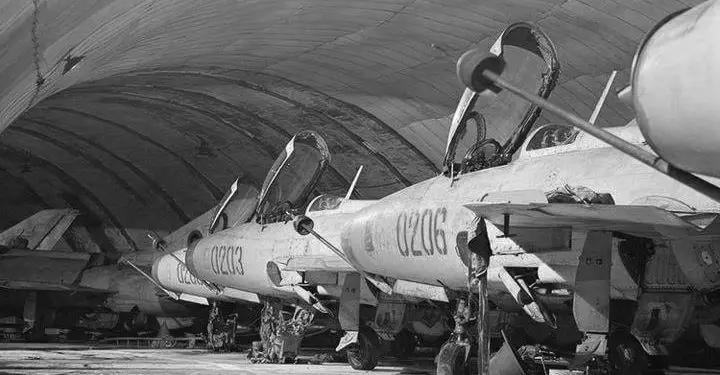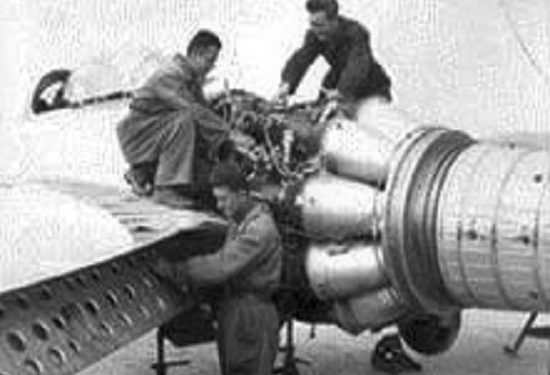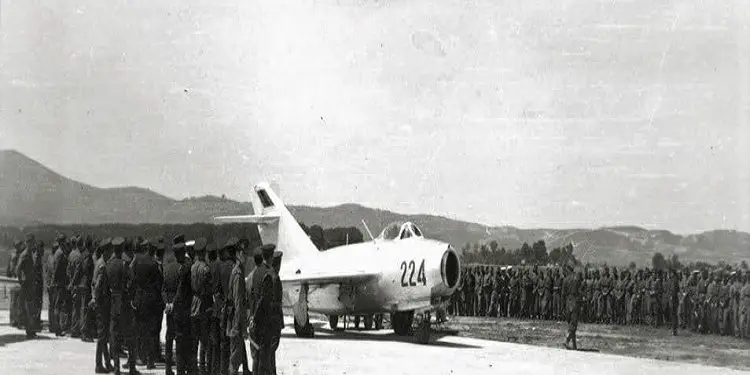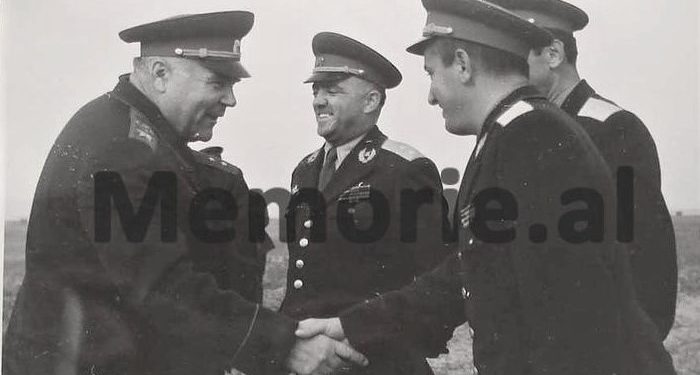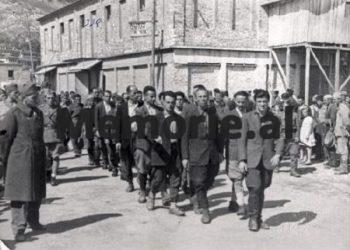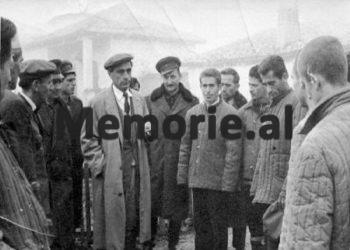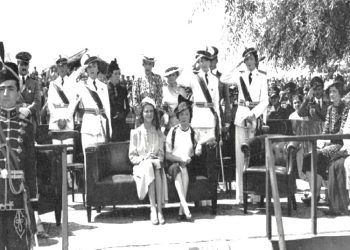By Nizai Nelaj
The seventh part
– At the Chinese Military Aviation School –
Memorie.al / Expelled from the Soviet School of Aviation, with dreams cut in half, part of the group of student pilots, who had studied for a year in the city of Bataysk, on January 8, 1962, after a “hell” cruise ”, with a cargo ship, we arrived at the center of China’s Third Military Aviation School in Chin Zhou City. It is located in the “heart” of Manchuria; at that time there were about 200,000 inhabitants. Without any prominent industry. A city with 2-3 story buildings but paved roads. The terrain around the city was plain; next to it are the Western shores of the Yellow Sea. One of the values of this city was the fact that it was the center of China’s Third Military Aviation School. My going to this school and that city was a lucky chance. In the list of 7 students of our course, which included: Adem Çeça, Dhori Zhezha, Mihal Pano, Bashkim Agolli, Andrea Toli and Sherif Hajnaj (Bracki), my name, Niazi Nelaj, was included, quite by chance?
Continues from last issue
One of the chief’s attendants, who were sitting with a notebook in his hand, quickly and humbly wrote something on that bundle of notebooks and put it in his elegant bag. What we heard shocked us, although, as the events unfolded, the order was never carried out and Jorgo “bashibozuku”, continued and completed the curriculum, together with his friends.
However, the strictness shown by the big boss shook us and changed our date. With the words he said, the general once again showed the “teeth” of power, which, if it came in front of you, would cause havoc. We listened to what the big boss said and no one drank after him. Who cares? That same day we boarded the train and returned to our school. We felt like that person who is after a “cold shower”.
The Chief of the Army Staff, General Petrit Dume, received us coldly and spoke harshly to us. Perhaps those harsh words did not belong to us; anyway he made a prediction. The refusal to continue school and the revolt of our fellow officers, meanwhile, had been channeled into political channels. Someone called it desertion; in other military circles they compared it to treason against the motherland, etc. The opinions were different and the commentators – all kinds.
The returnees, according to skills and inclinations, were organized; some in the Air Force, others in the army and some were released from the army and no one took care of them. We were too young and without access to judge their case, but in our hearts, as pilots, we regretted the punitive measures taken against them, and we never liked the block away of those able and capable boys passionate about flying, who would certainly bring freshness and innovation to the life of our Aviation.
Someone harassed us in matters of patriotism and tried to give us patriotism lectures. He even made comparisons which are not made. We felt insulted. As for that, I say, competently, having experienced that our homeland withstood a rather difficult test, at the end of September 1961, on the train that took us from Rostov-on-Don to Moscow, after the ultimatum for left within 48 hours, the Soviet border.
In China, we came somewhat older and more battered by life; we had our experience, individual and collective, which helped us not to tread on rotten wood. We listened to the moralizing of the big boss’s companions for education, but we multiplied them by zero. We had one goal, to become pilots, and we met this goal, not without collision, with our “Chinese friends”.
The great chief and the military delegation he led held talks, ordered the armaments needed by our Army, saw the wonders of China’s history and beautiful nature, and satisfied that we too had been taught a good lesson, returned to the Motherland. . The change was left to us. We would encounter daily the living conditions and difficulties of that particular profession.
Together with the management staff of the school, we programmed the development of the theoretical process and flying practice. We presented our requirements and objectives to the managers. We emphasized that we should start and finish the air training program as soon as possible, graduate fighter-bomber pilots, for which our army and Air Force were hungry, and return to our homeland, to strengthen the “castle of Socialism” in Europe.
We gave political colors to the technical issue, as the locals wanted. With the slogan, that our country was surrounded by countries that did not want us well, but aimed at the assimilation of our people, a close friend and ally of the great and glorious Chinese people, etc. etc. The goal was only to speed up the qualification process.
We were surprised when we saw that the school managers listened to us very attentively took notes and made promises that our word would be taken into account when designing the programs. In fact, as we saw later, they acted as they had planned and as they had received instructions from “above”. How do they say: “We did ours; they went on their own”! However, we thought that we had convinced those who were in charge of our education and we started working on the concretization of the programs.
Needy but not humble
Perhaps this phrase would fit, not just the situation but, in particular, our behavior. We had gone to China driven at the height of air preparation. It is not too much to remember that, on the day when we took the return journey to Tirana; we had laid the groundwork and were going to take the exam, in flight, to switch to another type of aircraft. We were lucky that there was a clear path to pursue our space dream, which had just begun. We were really driven, but not down.
We were not like that woman of old who, when her husband found her guilty, “chased” her (chased her out) from the house, and she, without the support of the public, wandered around and submitted to bad luck, however it came. We, on the contrary, came to learn to fly, because our country “could not support us”. Thus we were not beggars, but dignified. That’s why we held our heads high. Any servile behavior of any statesman of our country, which caused irreparable mistakes, had no reason to fall on our fragile backs. Yet we faced the created ordeal, through no fault of our own.
As usually happens, we started the work with theoretical preparation in the classroom. The goal was to get to know the peculiarities of the organization and development of flights in China and to detail the implementation of the program in the conditions of the Manchuria region. We wanted to learn something more, in theory and in practice, from the Chinese experience of flying. The theoretical program was closely related to the characteristics of the use, on the ground and in the air, of the airplane we were going to fly. Let’s not take the hack, the theoretical process, in the classroom, from where we started; the Chinese friends had evaluated it quite seriously.
To guide us in the theoretical preparation, they had called the most prominent and competent lecturers known in their academic circles. For the sake of the truth, it must be said that our theory teachers, not only had an outstanding theoretical level, but, during teaching, were “very single”, in the assessment of our knowledge. They did not let you go without being convinced that you had mastered the subject.
Despite the talks we had made and our requests, we were surprised to be told that we would be subject to a reduced flight schedule (about 50 hours), in the Yak-18 U, tail-wheel propeller aircraft. So we were going to repeat in a way the flight program that we had done at the Soviet Aviation School.
In our opinion, this was a step back and not every repetition is, as they say, “Mother of knowledge”! Sometimes repetition becomes annoying. That’s what happened to us. The plane ‘Yak-18 A’, with which we had flown in Batajsk, was the most advanced of the type that the hosts proposed to us.
The authorities of the aviation school argued this backwardness as follows: You have had time without flying and your habits have changed day by day; you have to reset habits, on the fly. The light training aircraft ‘Yak-18 U’ is similar to the aircraft ‘Yak-18 A’, which we had flown at the Soviet Aviation School.
The Chinese flight specialists needed to know our flying levels and habits in order to program the next step. So far, with their opinion and intentions, we were in agreement; but “the rabbit slept elsewhere”. The Chinese could not fully respond to the start of flights with us on Mig-15 Bis jet planes.
We are not talking about technicians because we had plenty of airplanes, but with instructors of piloting techniques. Thus, they sought to gain time. For those of us who had flown in more advanced aircraft, such as the ‘Yak-18 A’, not a little, but about 120 hours, returning to an older type of aircraft was a waste of time.
In 1962, when we went to China, but also afterwards, in the airfields and fields of that country, airplanes of the past type were landing and taking off. There were also those who had participated in air battles during World War II and the Korean War. I had seen ‘Yak-11’ planes fly over the sky of the city where we were stationed and beyond; “Jak-9 P”; “Il A-9”; “Tu-4” etc., which had been out of use by the armies of Eastern countries.
The plane we were going to fly with to restore air skills was more backward compared to the plane we had trained with in Batajsk. To be honest: we did not welcome this setback, we objected as much as we could, but, in the face of the Chinese’s insistence, we did not take the matter to the point of rejection, as our fellow officers did.
In the end, we were the needy and the owners of the house were extending the hand of friendship to us, with what they had, which we could not refuse. The seriousness with which the owners of the house treated the matter forced us to be more sparing in our requests.
We did not find it easy to get into the repetition of things we had experienced and knew. However, in the learning process where we were guided by people with a reputation in their field, we soon realized that we had something to learn from them! We learned a lot from the tenacity of the theory lecturers to explain, down to the simplest details, every element of flight.
The Chinese teacher did not leave you without being convinced that you had properly understood each element of the formula and the necessity of carrying out, with scientific rigor, the elements of flight. The Chinese teacher, with his “stinginess”, as he gave deep and scientifically argued explanations, when you answered, you had to show that you penetrated deeply into the essence of the matter.
The laboratories and classrooms in the Chinese Aviation School, at that time, were probably not of the same quality as in the Soviet school, but this “deficiency” was compensated by the preparation and fantastic teaching skills of the local lecturers.
In the spring of 1962, when we had only been in China for 3 months, our student pilot group of 7 and the navigator group, which consisted of 20 students, moved from the city of Chin Zhou to the village of Liu Shi Bao, where the field aerodrome was located, which was called the “Northern Aerodrome”.
At this field aerodrome, 5-6 km. away from the city, we would conduct air training, with the training planes, with propellers, ‘Yak-18 U’. There we settled in a permanent campsite, where there were 1- and 2-story buildings. The field where the planes took off and landed resembled the now forgotten field of Drenova, in the district of Korca, which has been functioning as such since the time of the Second World War.
Except the field at Liu Shi Bao was not so steep and in terms of size exceeded the field of Drenova. The surface of the plot was covered by grass, which was green at all times, and its texture was stony. Sometimes, when the plane’s wheel moved, the pebbles became dangerous for its propeller. The direction of descent and ascent was North-South; the lawn was very well drained and the plane could land and take off even 30 minutes after the rain stopped. As in the former field of Laprak.
I will not deal with the detailed description of the geometric and flying characteristics of the aircraft ‘Yak-18 U’, but I will briefly point out that it is the predecessor of the aircraft ‘Yak 18 A’ and some of its indicators are not at the same level of quality . Its weight is lighter; engine – less powerful; speed in flight – less and its stability, on the ground and in the air, weaker. Of course, the safety of the pilot’s life, flying in this plane, was the least.
Due to the tail wheel, the Yak-18 U aircraft is more difficult to control while moving on the ground, and is less stable in take-off and landing. The height at which the piloting figures were performed, “in the area”, was the same as that of the ‘Yak-18 A’, while the speed of completing the piloting figures was 10 km/h lower and the club condition of completing the them created a not so pleasant feeling for the pilot.
The speed at which the pilot initiated the vertical and horizontal figures was close to the evolutionary speed, beyond which the aircraft becomes unstable; his balance is disturbed and he can no longer stay in the air, but falls with free roots, as a dry leaf falls from a tree. Difficult in the air, managing his movement on the ground was somewhat more difficult. During the take-off process and during the rollover, after touching the wheels with the ground, the pilot had difficulty maintaining the straight-line movement of the ‘Yak-18 U’ plane.
Another factor was added to the gyroscopic moment of the propeller, that of the lift of the tail wheel. When the progressive speed reached 80 km/h, in order to facilitate and speed up the separation of the plane from the ground, the pilot, with a forward movement of the control handle, moved the rear wheel further from the ground, about 25 cm.
Our group of 7 students was more advanced compared to the students in the tour group. Although we started the flights at Liu Shi Bao Village Airport at the same time, we were always several steps ahead of them in the implementation of the flight schedule. So when they flew in the circle and weren’t released on their own yet, we flew in the area.
Since the nature of the flights and the type of aircraft were the same, the air training of both groups took place in the same shift. We were lined up in different squadrons (fours). In the flight group I was a part of, there were 3 students, for pilots: Sherif Çelo Hajnaj (Bracki), Dhori Nasi Zhezha and unw, Niazi Xhevit Nelaj.
The pilot technique instructor of our group was a Chinese named Ma. I don’t remember the last name. I learned that in Albanian, his name means: “Horse”. This, our Ma, was a boy for a boy’s head. About 27 years old, with a fit body, agile and smart, with straight hair like a Chinese and had a perfect piloting technique. He was patient; a true Chinese.
Those of us, who had flown to Batajsk, the 50 hours of the air training program, would be conducted mainly in the area (pilotage); the students of the Sturman group would start the program all over again. For both us and our flight instructors, repetition of the program was not desired; therefore, we took both sides lazily (si bachai).
The accuracy and demand of the account on the part of the Chinese, in the flight were at quite high levels. If nothing happens to us, on the ground and in the air, it is thanks to the organization of the direction of flights with high demands on their part, in addition to our qualities. However, we were not left without anything. One case, which was classified as a premise for extraordinary events, I will describe below, as I remember it:
During the take-off with the ‘Jak-18 U’ plane, student pilot Ivzi Minxha, originally from Pogradec, an officer of the Sturman squadron, due to his mistake, got disoriented and got out of the difficult situation by interrupting the take-off. The length of the lift belt was sufficient to do this. The premise remained only a premise; without causing any dangerous consequences for the life of the pilot and without technical damage. Memorie.al
The next issue follows




